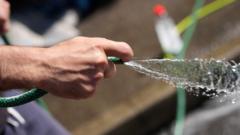Is a Hosepipe Ban Coming for Southern Water's 1 Million Customers?

Understanding the Hosepipe Ban: What Southern Water Customers Need to Know
As the UK grapples with prolonged dry weather, Southern Water has announced a hosepipe ban impacting nearly one million customers across Hampshire and the Isle of Wight. This significant decision, effective from 09:00 BST on Monday, highlights the urgent need for water conservation amid dwindling supplies. The ban restricts various activities, including watering gardens, washing cars, and filling paddling pools. Managing Director Tim McMahon emphasized the necessity of collective action to ensure the sustainability of water resources for both consumers and the environment. This article delves into the implications of the hosepipe ban, the reasons behind it, and the broader context of water management in the UK.
Why is Southern Water Implementing a Hosepipe Ban?
The primary reason for the hosepipe ban is the critically low levels of water in the River Test and Itchen chalk streams, which serve as a major water supply source for the region. Reports indicate that water flows are down by 24% compared to the normal levels for this time of year. The Environment Agency has declared that the Solent and South Downs region is experiencing prolonged dry weather, exacerbating the water scarcity situation.
Several other water companies, including Thames Water, Yorkshire Water, and South East Water, have also introduced hosepipe bans, indicating a wider issue of water shortages across the UK. Customers are urged to act promptly to avoid a spike in demand that could worsen the situation.
The Impact of Prolonged Dry Weather
Prolonged dry weather has several consequences not just for water supply but also for the environment:
- Reduced Water Levels: Rivers, lakes, and reservoirs experience lower water levels, threatening aquatic ecosystems.
- Impact on Wildlife: Species like Atlantic salmon and the southern damselfly, which rely on healthy chalk streams, face risks to their habitats.
- Increased Demand: As drought conditions persist, the demand for water increases, putting further strain on already limited resources.
What Activities are Affected by the Hosepipe Ban?
The hosepipe ban encompasses a variety of activities that many residents may take for granted. Here’s a list of what is prohibited under the ban:
- Watering gardens and lawns using a hosepipe.
- Washing cars, driveways, or patios with a hosepipe.
- Filling paddling pools, hot tubs, or any other water-based recreational facilities.
- Using hosepipes for cleaning windows, conservatories, or similar outdoor surfaces.
Violations of the hosepipe ban can result in fines of up to £1,000, underscoring the seriousness of adhering to these restrictions.
What Measures is Southern Water Taking to Address the Water Crisis?
In light of this crisis, Southern Water is not only implementing a hosepipe ban but is also actively seeking to improve the efficiency of its water management systems. Here are some initiatives the company is undertaking:
- Leak Detection: The company has invested in innovative technologies such as drones, sensors, and sniffer dogs to locate and fix leaks more rapidly.
- Infrastructure Improvements: Efforts are being made to upgrade pipes, reservoirs, and other water supply facilities to enhance efficiency.
- Community Engagement: Encouraging customers to conserve water and contribute to sustainable usage practices.
The Bigger Picture: Water Management in the UK
The hosepipe ban in Hampshire and the Isle of Wight is part of a broader trend in water management across the UK. With the increasing frequency of droughts and changing weather patterns, water scarcity is becoming a pressing issue. The UK government has acknowledged the impending water crisis, with Water Minister Emma Hardy stating the need for urgent reforms. The government's "Plan for Change" includes:
- £104 billion in private investment.
- Construction of nine new reservoirs.
- Installation of new pipes to reduce leaks.
This multi-faceted strategy aims to address both current shortages and long-term sustainability in water management.
How Can Customers Contribute to Water Conservation?
While the hosepipe ban is a crucial measure to conserve water, individuals can also take proactive steps to mitigate water usage in their daily lives. Here are some practical tips:
- Use a Bucket: Instead of a hosepipe, use a bucket to wash your car or water plants.
- Mulch Gardens: Use mulch to retain moisture in gardens, reducing the need for frequent watering.
- Check for Leaks: Regularly inspect taps and pipes for leaks and repair them promptly.
- Collect Rainwater: Use water butts to collect rainwater for gardening purposes.
- Limit Shower Time: Reducing shower time can significantly cut down on water usage.
Conclusion: A Collective Responsibility
The hosepipe ban announced by Southern Water is a wake-up call for all residents in Hampshire and the Isle of Wight. As the region faces the challenges of prolonged dry weather and dwindling water supplies, it becomes imperative for everyone to take part in water conservation efforts. By working together, we can ensure that there is enough water for both consumers and the environment while safeguarding precious ecosystems like the chalk streams.
As we move forward, it's essential to remain mindful of our water usage and consider sustainable practices that contribute to the health of our environment. The hosepipe ban might be a temporary measure, but the commitment to responsible water use should be a long-term priority for everyone.
Frequently Asked Questions
What is a hosepipe ban?
A hosepipe ban is a restriction that prohibits the use of hosepipes for various activities such as watering gardens and washing cars, typically implemented during periods of water scarcity.
How long will the hosepipe ban last?
The duration of the hosepipe ban depends on weather conditions and water supply levels, with the aim of lifting the ban as soon as the situation improves.
What are the penalties for violating the hosepipe ban?
Individuals found using a hosepipe during a ban can face fines of up to £1,000.
Can I still water my garden during a hosepipe ban?
Yes, you can still water your garden using methods other than a hosepipe, such as using a watering can or bucket.
What can I do to help conserve water?
To conserve water, consider using a bucket for washing your car, fixing leaks, collecting rainwater, and limiting shower time.
As the hosepipe ban takes effect, how will you adjust your water usage habits to contribute to conservation efforts? #WaterConservation #HosepipeBan #SustainableLiving
Published: 2025-07-16 08:06:12 | Category: technology



